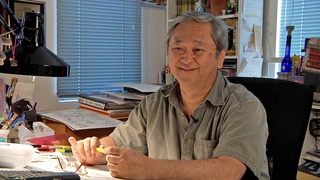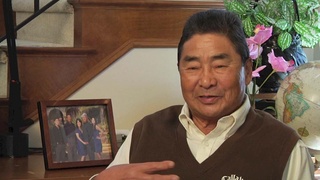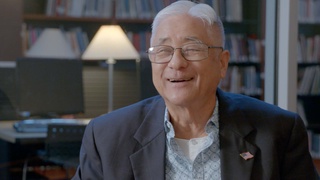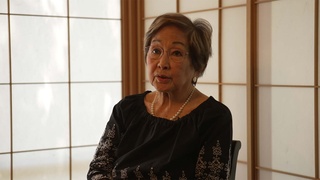Interviews
Possibility of being adopted by aunt
My family was very poor, and the reason why is because my father, being a photographer, there was no business during the Depression days. And so, I remember how my brothers would go on the roof to catch pigeons. And that would help put food on the plate. And as I mentioned, my mother had done laundry for five families. And because of that, I think, we were able to survive. But, somehow, you know, we had a big family, but we persevered. We were able to come through.
I remember when I was born, I was the sixth child, and there were five other mouths to feed. And I had an auntie who had a son, and she couldn’t have any more children. It was my mother’s younger sister. And my auntie wanted to adopt me, and it was very, very difficult, I know, for my family. But, my father used to say, “You give away pets, but you never give away children.” And to this day I'm very grateful, although it was very difficult for them, they kept me. And otherwise, fate would have been very different for me.
Date: December 15, 2003
Location: Hawai`i, US
Interviewer: Lisa Itagaki
Contributed by: Watase Media Arts Center, Japanese American National Museum.
Explore More Videos


On Getting the Call from J. Anthony Kline
(b. 1942) The first Asian American woman judge


Father's Sacrifice
(1941-2018) Japanese Canadian photojournalist and activist

Growing Up in Japan
(b. 1930) Half Japanese and grew up in both Japan and the United States.

Fifty Years and Going Strong
(1938-2020) Japanese American attorney and civil rights activist

Pop and Balls
(1938-2020) Japanese American attorney and civil rights activist


Facing discrimination in America (Japanese)
(b. 1936) Shin-issei welding business owner


Parents
(b. 1934) Award-winning Disney animation artist who was incarcerated at Topaz during WWII

My daughter couldn’t fit in Japan, so I decided to go back to America (Japanese)
(b. 1936) Shin-issei welding business owner

His sister Kiyo was like a second mother to him
(b. 1942) Japanese Peruvian incarcerated in Crystal City

How he met his wife
Professor of Law, University of Sao Paulo, Lawyer, Translator (b. 1948)

Parent’s Marriage
(b. 1939) a businesswoman whose family volunterily moved to Salt Lake City in Utah during the war.
